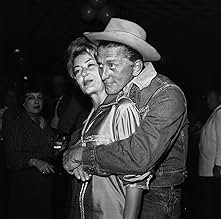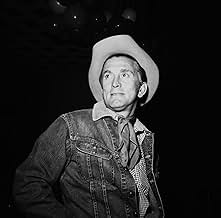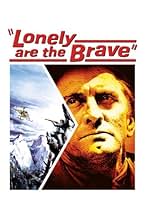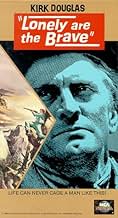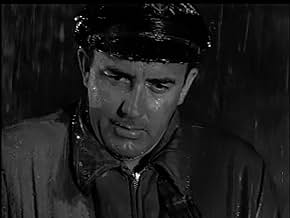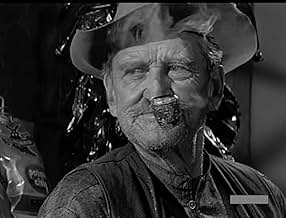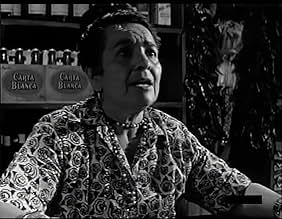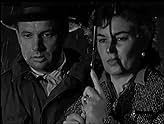Un cowboy farouchement indépendant se fait enfermer en prison dans le but de s'en échapper avec un vieil ami.Un cowboy farouchement indépendant se fait enfermer en prison dans le but de s'en échapper avec un vieil ami.Un cowboy farouchement indépendant se fait enfermer en prison dans le but de s'en échapper avec un vieil ami.
- Réalisation
- Scénario
- Casting principal
- Nomination aux 1 BAFTA Award
- 1 victoire et 2 nominations au total
- First Deputy Arraigning Burns
- (as Bill Mims)
- Prisoner
- (non crédité)
- Bar Patron
- (non crédité)
- Bar Patron
- (non crédité)
- Airman in Helicopter
- (non crédité)
- Prisoner
- (non crédité)
- Prisoner
- (non crédité)
- Bar Patron
- (non crédité)
Avis à la une
Director Miller and cinematographer Philip Tathrop splendidly capture the beauty, as well as ruggedness, of the American southwest in the scenes of pursuit with some truly striking black and white photography. The film's opening scene, in fact, with Douglas relaxing, his hat over his eyes, as he lies on the ground, a moment seen in so many other westerns, the peace suddenly shattered by the sonic sounds of jets flying overhead, is a wonderful metaphor for what is to follow. The film also features a remarkably well staged and intense bar fight between the cowboy and a mean spirited one armed veteran (played by an unbilled Bill Raisch, best known for television's The Fugitive series).
Douglas delivers one of his most relaxed and engaging performances as Jack Burns, a loner, as he calls himself, whose greatest love is for a horse, Whiskey, to whom he talks and gently scolds, at times, throughout the film. At the same time, though, the actor, has great chemistry with Gena Rowlands as the wife of his imprisoned friend. There's an unspoken special feeling between these two when they first sight one another in the film, and they afterwards share a few moments of great sensitivity. It's a shame that Douglas and Rowlands were never re-teamed on screen again.
Another highly effective performance in the film is that of Walter Matthau, as a gum chewing, laid back sheriff, in charge of pursuing Douglas in the wild countryside but who, for two cents, would probably just as soon like to see the cowboy get away. And, in contrast to Matthau, there is a mean spirited George Kennedy as a nasty prison guard who enjoys tormenting and beating up prisoners.
Lonely Are The Brave has a memorable,finale, one that will stay with you, as much as Douglas's quite extraordinary performance. This film is a little gem that is available on DVD and occasionally shown on Turner Classic Movies. Do yourself a favor and watch it if you can. You won't be disappointed.
This modern Western cogently conveys how civilization with its corresponding government and never-ending laws naturally squelches personal independence and freedom. The bigger the populace means the bigger the governing regulations, and the less the liberty. One starts to suffocate in a world of borders, fences and laws. These are human-made inventions that don't even exist. Fly over the USA and you'll see no state or county borders or city limits. They're all human-made inventions that don't exist, except in a legal sense. Burns hearkens back to an earlier era where one didn't even need an ID. He doesn't fit into the mold of the modern world. All he has is his mare, Whiskey, the clothes on his back and his basic necessities. They're all a real cowboy needs, but the cowboy was a vanishing breed circa 1961.
Director Miller wisely accentuates Gena's curvy beauty as Paul's wife, Jerri. The nature of her relationship with Burns is initially a mystery, but all is revealed before the final act and it's well done. Whether someone is married or not, it doesn't mean s/he can't love someone else who's single or married. But marriage itself is a border that cannot be lawfully crossed except by the person's spouse. The film acknowledges this and so do Burns and Jerri. They're people with feelings, but they're also wise and hence don't allow their passions to compel them to trespass marital fences.
All these items amongst others (like the quality score) make "Lonely are the Brave" a minor near-masterpiece. Unfortunately, it's flawed by some tedious stretches, like the overlong jail sequence, and unconvincing or dumb elements; for instance, the idea that Burns wouldn't know enough to make sure there weren't any cars before crossing a highway on horseback (Seriously?). It's also marred by B&W photography, which would've really come alive if shot in color. The basic plot and theme were done later by the superior "First Blood" (1982) and "The Electric Horseman" (1979) respectively.
The film runs 107 minutes and was shot in the Albuquerque, New Mexico, area.
GRADE: B+
One of the strengths of the movie is that it has a well developed central character. Kirk Douglas manages to create a believable cowboy, one that is stuck in the past refusing to acknowledge that the world has changed and he needs to adapt. Jack Burns is indeed a lonely cowboy because his way of seeing things is not shared by the others. The film also has the advantage of having a good screenplay, written by Dalton Trumbo ("Spartacus", "Papillon"), one of the best screenwriters of his time.
This was Kirk Douglas' favorite movie of his own and you can surely tell that because he gives here one of his best performances. The acting is generally good, the roles of Walter Matthau and Gena Rowlands being worth mentioning. You can also check out George Kennedy in one of his early roles, as the brutish deputy Guttierez.
The movie may have its flaws, but it is definitely worth seeing by everyone. Due to its style and content the film also marks a transition from classical westerns to modern ones, so fans of the genre should not miss it.
My rating: 7,5/10
Le saviez-vous
- AnecdotesThe one-armed man (Bill Raisch) tells John W. "Jack" Burns (Kirk Douglas) in the bar that he lost his arm at Okinawa during World War II. Raisch lost his right arm in a fire on-board a ship during that conflict. He was Burt Lancaster's stand-in, and later landed a recurring role, as the real killer of Dr. Richard Kimble's wife, on Le fugitif (1963).
- GaffesAt the 1:33 mark, whilst Burns is resting with his horse, Whisky, under a tree, you can see a thin black line attached to the horse's bit, coming in from the left. It appears that it is being pulled on by a crew member to keep Whisky's head up from where she is grazing.
- Citations
Jack Burns: I didn't want a house. I didn't want all those pots and pans. I didn't want anything but you. It's God's own blessing I didn't get you.
Jerri Bonds: Why?
Jack Burns: 'Cause I'm a loner clear down deep to my guts. Know what a loner is? He's a born cripple. He's a cripple because the only person he can live with is himself. It's his life, the way he wants to live. It's all for him. A guy like that, he'd kill a woman like you. Because he couldn't love you, not the way you are loved.
- Crédits fousthe credits at the beginning of the film use a font with uppercase consonants and lower case vowels (of various sizes) , but for the names only.
- ConnexionsFeatured in Walter Matthau: Diamond in the Rough (1997)
- Bandes originalesOh! Susanna
Composed by Stephen Foster
Meilleurs choix
- How long is Lonely Are the Brave?Alimenté par Alexa
Détails
Box-office
- Budget
- 2 000 000 $US (estimé)
- Durée1 heure 47 minutes
- Couleur
- Rapport de forme
- 2.39 : 1
Contribuer à cette page



